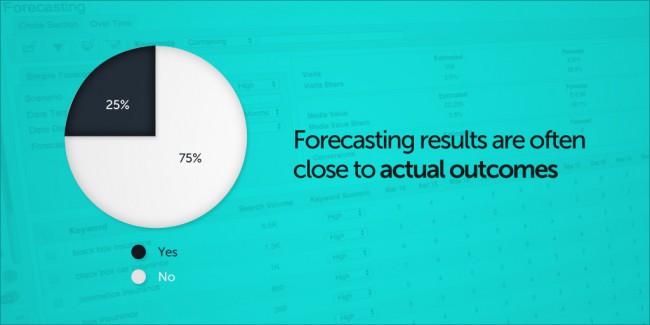
Earlier today Linkdex published the results of their recent survey of SEOs. The subject? Forecasting. The data? Very interesting and here’s why.
We in the SEO community tend to be data-based. We like algorithms and analytics. We like sorting through numbers to determine the best path forward and make the best decisions for our clients with the information at hand. And yet … in this one area it seems that we’re not even taking our own advice and we know it. To look at this further we need to dig into what data the study yielded. Here’s the Cliff notes:
- 96% of SEOs forecast
- Financial investments are made based on forecasts
- 92% of forecasting is deemed time consuming (and let’s remember that time is a cost)
- Only 25% of respondents found that forecasts came in close to the actual outcomes
Let me repeat that, in only 25% of cases were the forecasts close to the outcome. There are games in Vegas with better odds than that.
Now of course all we’re talking about here is forecasting being accurate which isn’t as bad as it may sound. This data does not state that in only 25% of cases will the business have a decent ROI on their marketing budget, simply that the numbers put forward in the forecast were not accurate.
Such is the disadvantage in forecasting in an arena where the rules change and as well, where they players themselves can change the rules. Not only are we contending with Google algorithms but on top of that we’re dealing with other companies that may change their strategies, invest more heavily in paid search, etc. One can see easily how forecasting can becomes a rabbit hole. One of my favorite quotes on the subject was:
“There are too many signals that can affect you, many of which you may not even control. So forecasting with so many variables in play can make you look very silly, very quickly!” – Paddy Moogan, Aira
Of course we all likely realize that the goal is to push forward and provide a solid ROI for the client and projections, provided they include a disclaimer, should be known to be best guesses in the current environment. For example, from past experience I can generally gauge fairly well the timelines to ranking in a specific niche/competition level. Match that with conversion rate data and keyword traffic data and you’ve got a forecast. Will it be accurate? Probably not but it’s the best I can do and at the end of the day stands about as much chance of being over as under and provided the direction was good – the business will prosper either way.
It’s an interesting study on us doing what we know is inaccurate because there isn’t a better way to do things. You can read more about the data on the Linkdex site at http://www.linkdex.com/blog/survey-forecasting-importance/.
And of course I welcome any comments below and if you have forecasting methods you’ve found provide higher-than-average accuracy feel free to share. 🙂
Latest posts by Dave Davies (see all)
- Google Entity Metrics: The Role of Entities in SEO - January 20, 2016
- Google AdWords Launches Holiday Snippets & Texts - November 13, 2015
- Facebook Moments: The Best App You Should Be Afraid Of - June 25, 2015
- Your New Advantage on Mobile Search - April 30, 2015
- How Accurate is SEO Forecasting? - March 13, 2015



